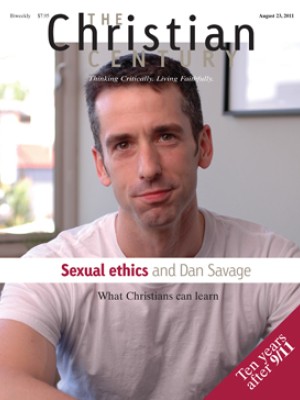Sunday, September 4, 2011: Ezekiel 33:7-11; Matthew 18:15-20
If the watchman doesn't "sound the trumpet" and dissuade the wicked from their ways, the Lord promises to hold the watchman accountable.
A person in our church was complaining bitterly and threatening to leave the church. His power and influence were waning and he was lashing out. After prayer and reflection, I decided that confrontation would escalate the situation into a polarizing fight. Instead of confrontation, he needed space. Like a child throwing a tantrum, he needed to cry it out and regain his composure. His friends in the congregation and I made an effort to give him space. We tried to avoid reacting defensively, prayed for him and maintained our friendships as best we could. I had made a judgment call about judgment. As the apostle Paul said, "If it is possible, so far as it depends on you, live peaceably with all" (Rom. 12:18).
But sometimes I wonder if I'm shirking my responsibility when I don't point out a believer's fault. If the problem is just between us, it seems reasonable to let it slide. If the escalation of tension will be greater with confrontation than the patience required to endure the problem, I am inclined to live with the problem. Is this the right response? Does "turning the other cheek" mean standing my ground without confronting my brother? Or is it cowardly to evade confrontation?
Read our latest issue or browse back issues.
Turning the other cheek is not the same thing as turning a blind eye. Sometimes love may require that I undertake a costly initiative to save my brother when my every impulse is to ignore him. In the Old Testament lectionary companion to this Gospel text (Ezek. 33:1–11), the watchman is obligated to warn the wicked. If the watchman doesn't "sound the trumpet" and dissuade the wicked from their ways, the Lord promises to hold the watchman accountable for the Lord's judgment of the wicked.
Jesus' spiritual direction on confrontation compels us to distinguish between definable overt sins and the chronic friction we inflict on one another. We are habitual sinners—troublemakers at the core. If we confronted one another over every issue that bothers us, we would spend all of our time scheduling appointments. Matthew identifies the sins that clearly violate God's word; they include idolatry, infidelity, sexual sins, blasphemy, racial hatred, blatant greed, intentional lying and deliberate manipulation. One way to look at this is to ask whether the sin in question is worth taking to the congregation or if, for the sake of God's holiness and the sinner's need for repentance and forgiveness, we are to confront our brother or sister quietly and prayerfully. If the process fails altogether, Jesus advises treating the hardened sinner "as you would a pagan or a tax collector." This verdict comes from the one who went out of his way to win over pagans and tax collectors, and from Matthew himself, a former tax collector who knew the power of this gospel love.
Jesus confronted both Judas and Peter in the Upper Room, but in a way that gave them plenty of room to respond positively. Like the faithful watchman, Jesus warned Judas. He exposed his treacherous heart and let Judas know that he was fully aware of his deception. Judas's feigned innocence ("Surely not I, rabbi?") thinly concealed a heart that had grown hard and resistant to Jesus. Jesus also confronted Peter, warning him of his weakness and vulnerability. Peter was not as strong as he thought he was. Jesus put him on notice in a confrontation that formed the basis for Peter's confession and restoration after the resurrection.
There have been times when I did not confront someone because the issues in question belonged to gray areas in church life. I think of the person who uses "ministry" to satisfy his or her ego; of young families who forfeit worship so their children can play soccer or baseball on Sunday morning; of the crusader who fixates on a single issue; of the "God and country" worshipers who equate national pride with the kingdom of God. These problems are difficult to confront because the sin seems more subtle and elusive. I am comforted by Jesus' parable of the wheat and the weeds (Matt. 13:24–30), because he seems to be cutting us some slack, allowing us to let some things take their course. He's telling us to leave the "weeding" and judging to God. With some of these sticky, intractable problems it is sufficient to pray earnestly and let God be God.
Direct confrontation may not be the best approach when the sin is difficult to name. New Testament scholar Dale Bruner distinguishes between the censorious Christian who is too eager to judge or the coercive Christian who is too quick to "pull up the weeds" and the conscientious church that takes church membership and discipline seriously. Mercy takes the sinner seriously, even if it means opening up a can of worms.






